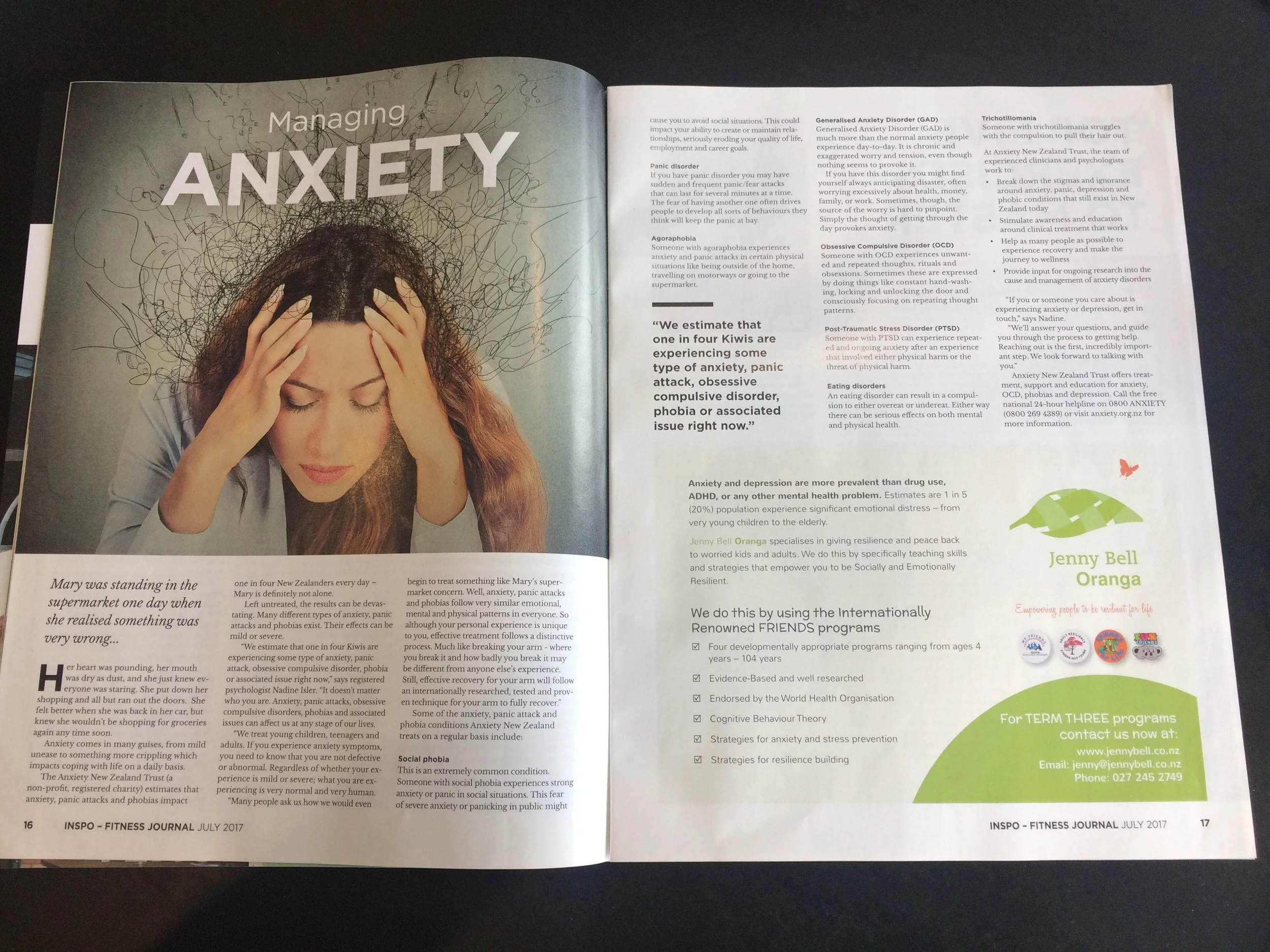The Inspo Fitness Journal printed an article I wrote about anxiety in their July edition. Have a read below and let me know what you think!
Here's the article on the Fitness Journal website, here's the ebook of the whole magazine, and I've also reproduced the article below in case it goes offline elsewhere!
Managing anxiety
Mary was standing in the supermarket one day when she realised something was very wrong…
Her heart was pounding, her mouth was dry as dust, and she just knew everyone was staring. She put down her shopping and all but ran out the doors. She felt better when she was back in her car, but knew she wouldn’t be shopping for groceries again any time soon.
Anxiety comes in many guises, from mild unease to something more crippling which impacts coping with life on a daily basis.
The Anxiety New Zealand Trust (a non-profit, registered charity) estimates that anxiety, panic attacks and phobias impact one in four New Zealanders every day – Mary is definitely not alone.
Left untreated, the results can be devastating. Many different types of anxiety, panic attacks and phobias exist. Their effects can be mild or severe.
“We estimate that one in four Kiwis are experiencing some type of anxiety, panic attack, obsessive compulsive disorder, phobia or associated issue right now,” says registered psychologist Nadine Isler. “It doesn’t matter who you are. Anxiety, panic attacks, obsessive compulsive disorders, phobias and associated issues can affect us at any stage of our lives.
“We treat young children, teenagers and adults. If you experience anxiety symptoms, you need to know that you are not defective or abnormal. Regardless of whether your experience is mild or severe; what you are experiencing is very normal and very human.
“Many people ask us how we would even begin to treat something like Mary’s supermarket concern. Well, anxiety, panic attacks and phobias follow very similar emotional, mental and physical patterns in everyone. So although your personal experience is unique to you, effective treatment follows a distinctive process. Much like breaking your arm – where you break it and how badly you break it may be different from anyone else’s experience. Still, effective recovery for your arm will follow an internationally researched, tested and proven technique for your arm to fully recover.”
Some of the anxiety, panic attack and phobia conditions Anxiety New Zealand treats on a regular basis include:
Social phobia
This is an extremely common condition. Someone with social phobia experiences strong anxiety or panic in social situations. This fear of severe anxiety or panicking in public might cause you to avoid social situations. This could impact your ability to create or maintain relationships, seriously eroding your quality of life, employment and career goals.
Panic disorder
If you have panic disorder you may have sudden and frequent panic/fear attacks that can last for several minutes at a time. The fear of having another one often drives people to develop all sorts of behaviours they think will keep the panic at bay.
Agoraphobia
Someone with agoraphobia experiences anxiety and panic attacks in certain physical situations like being outside of the home, travelling on motorways or going to the supermarket.
Generalised Anxiety Disorder (GAD)
Generalised Anxiety Disorder (GAD) is much more than the normal anxiety people experience day-to-day. It is chronic and exaggerated worry and tension, even though nothing seems to provoke it.
If you have this disorder you might find yourself always anticipating disaster, often worrying excessively about health, money, family, or work. Sometimes, though, the source of the worry is hard to pinpoint. Simply the thought of getting through the day provokes anxiety.
Obsessive Compulsive Disorder (OCD)
Someone with OCD experiences unwanted and repeated thoughts, rituals and obsessions. Sometimes these are expressed by doing things like constant hand-washing, locking and unlocking the door and consciously focusing on repeating thought patterns.
Post-Traumatic Stress Disorder (PTSD)
Someone with PTSD can experience repeated and ongoing anxiety after an experience that involved either physical harm or the threat of physical harm.
Eating disorders
An eating disorder can result in a compulsion to either overeat or undereat. Either way there can be serious effects on both mental and physical health.
Trichotillomania
Someone with trichotillomania struggles with the compulsion to pull their hair out.
At Anxiety New Zealand Trust, the team of experienced clinicians and psychologists work to:
• Break down the stigmas and ignorance around anxiety, panic, depression and phobic conditions that still exist in New Zealand today
• Stimulate awareness and education around clinical treatment that works
• Help as many people as possible to experience recovery and make the journey to wellness
• Provide input for ongoing research into the cause and management of anxiety disorders
“If you or someone you care about is experiencing anxiety or depression, get in touch,” says Nadine.
“We’ll answer your questions, and guide you through the process to getting help. Reaching out is the first, incredibly important step. We look forward to talking with you.”
Anxiety New Zealand Trust offers treatment, support and education for anxiety, OCD, phobias and depression. Call the free national 24-hour helpline on 0800 ANXIETY (0800 269 4389) or visit anxiety.org.nz for more information.
By INSPO Magazine | July 5th, 2017 | Health, Wellbeing


